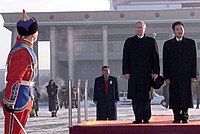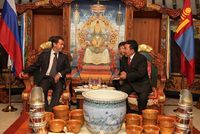Mongolia–Russia relations
 | |
Mongolia |
Russia |
|---|---|
You can help expand this article with text translated from the corresponding article in Russian. (January 2022) Click [show] for important translation instructions.
|
According to a 2017 survey, 90% of Mongolians have a favorable view of Russia (38% "strongly" and 52% "somewhat" favorable), with 8% expressing a negative view (2% "strongly" and 6% "somewhat" unfavorable).[1]
Background
Russia and Mongolia share a 3,500-kilometer border.[2] When Chinese forces attacked Mongolia in 1919 to negate its independence from China, the Russian Asiatic Cavalry Division commanded by Roman von Ungern-Sternberg helped Mongolia ward off the invasion. The


Soviet Union and the Mongolian People's Republic
The Soviet Union supported the
The communist regimes of Mongolia and the USSR forged close bilateral relations and cooperation.
Contemporary times

Following the
In March 2022, Mongolia abstained from the UN vote to condemn the Russian invasion of Ukraine.[9]
In September 2022, Russian President Vladimir Putin attended the Vostok-2022 military exercise in the Russian Far East. Beyond Russian troops, the exercises also included military forces from Mongolia, among others.[10]
Due to Mongolia being the signatory of the
Most prominent economic collaboration between Russia and Mongolia is the Power of Siberia 2 natural gas pipeline, construction of which is expected to begin in 2024.[13] The planned 2,600 km pipeline connecting Russia and China via Mongolia will have a capacity of 50 billion cubic meters of gas per year and could be operational by 2030, generating transit fees and gas supplies for Mongolia.
State visits
From Soviet and Russian leaders to Mongolia
- Leonid Brezhnev (13-15 January 1966)[14]
- Leonid Brezhnev (November 1974)[15]
- Vladimir Putin (2000)
- Dmitry Medvedev (2-3 September 2009)
- Vladimir Putin (2-3 September 2014)
- Vladimir Putin (2-3 September 2019)
From Mongolian leaders to Russia
- Damdin Sükhbaatar (1921)
- Punsalmaagiin Ochirbat (1993)
- Natsagiin Bagabandi (1999)
- Natsagiin Bagabandi (9 May 2005)
- Nambaryn Enkhbayar (2006)
- Nambaryn Enkhbayar (2008)
- Tsakhiagiin Elbegdorj (9 May 2010)[16]
- Tsakhiagiin Elbegdorj (31 May 2011)
- Tsakhiagiin Elbegdorj (9 May 2015)[17]
- Khaltmaagiin Battulga (7 September 2017)
Gallery
-
Natsagiyn Bagabandi with Vladimir Putinin 2000
-
Nambaryn Enkhbayar with Vladimir Putin in 2005
-
Dmitry Medvedev with Tsakhiagiin Elbedorj in 2009
-
Khaltmaagiin Battulga with Vladimir Putin in 2017
See also
- Battle of Kulikovo
- Foreign relations of Mongolia
- Foreign relations of Russia
- Mongolia–Russia border
- Mongol invasion of Kievan Rus'
References
- ^ "Pre-Presidential Election National Survey of Mongolian Public Opinion" (PDF). iri.org. July 23, 2018.
- ^ a b c d Blagov, Sergei (May 2005). "Mongolia Drifts Away From Russia Toward China". China Brief. 5 (10). The Jamestown Foundation. Archived from the original on March 22, 2007. Retrieved 2008-06-16.
- ^ a b c Balazs Szalontai, "From the Demolition of Monasteries to the Installation of Neon Lights: The Politics of Urban Construction in the Mongolian People's Republic" in Sites of Modernity: Asian Cities in the Transitory Moments of Trade, Colonialism, and Nationalism (ed. Wasana Wongsurawat), pp. 165-66.
- ^ a b c d e Morris Rossabi, Modern Mongolia: From Khans to Commissars to Capitalists (University of California Press, 2005), pp. 31-37.
- ^ Alan J. K. Sanders, "Russia: Relations With Mongolia" in Historical Dictionary of Mongolia (3d ed.: Scarecrow Press, 2010), pp. 616-23.
- ^ a b c d e "Mongolia — Soviet relations". Library of Congress. Retrieved 2008-06-17.
- ^ a b c d e f "Russia Seeks To Restore Position in Mongolia As Most Favored Neighbor". Eurasianet.org. 2000-11-17. Archived from the original on 2017-08-31. Retrieved 2008-06-17.
- ISBN 99929-0-627-8, p. 55
- ^ "How Did Asian Countries Vote on the UN's Ukraine Resolution?". The Diplomat. 3 March 2022.
- ^ "Kremlin says Putin attends military exercises with Chinese forces". Al Jazeera. 6 September 2022.
- ^ "Situation in Ukraine: ICC judges issue arrest warrants against Vladimir Vladimirovich Putin and Maria Alekseyevna Lvova-Belova". International Criminal Court. 17 March 2023. Archived from the original on 17 March 2023. Retrieved 18 March 2023.
- ^ Flacks, Marti (20 March 2023). "The ICC Wants Putin. Now What?".
- ^ Adiya, Amar (2022-08-26). "Mongolia Maintains Neutrality After 6 Months of Ukraine War". Mongolia Weekly. Retrieved 2022-09-25.
- ^ "Wilson Center Digital Archive".
- ^ "Soviet Helps Mongolia Shed Feudalism". The New York Times. 14 December 1974.
- Presidential Press and Information Office. 9 May 2010. Retrieved 9 May 2010. [dead link]
- ^ Lucy Westcott (May 9, 2015). "Russia flexes military might as foreign leaders stay away from V-E parade". Newsweek. Archived from the original on 10 May 2015. Retrieved May 10, 2015.
External links
- (in Russian) Documents on the Mongolia–Russia relationship at the Russian Ministry of Foreign Affairs
Diplomatic missions
- (in Russian, English, and Mongolian) Embassy of Russia in Ulan Batar
- (in Russian, English, and Mongolian) Embassy of Mongolia in Moscow





